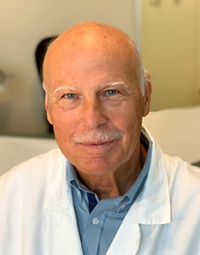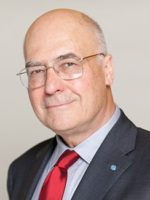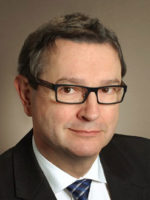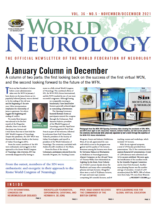By David B. Vodusek and Max Hilz Wolfgang Grisold, editor

Wolfgang Grisold
This issue of World Neurology introduces a committee and a specialty group, providing a better insight into the work of the WFN, and also providing opportunities to become involved in the WFN.
The Membership Committee is chaired by Dr. David Vodusek from Slovenia, who has outstanding experience in international scientific neurological societies. The role of the Membership Committee is to foster membership and provide care of members. Because not all countries of the world are WFN members, this role is important, as membership also fosters the development of neurology.
The Membership Committee and the Specialty Group for Autonomic Disorders have described their activity, and you will find outlines authored by the chairs below.
Prof. Vodusek: Dr. David B. Vodušek is emeritus professor of neurology at the University of Ljubljana, Slovenia, Faculty of Medicine. He held the position of medical director in the division of neurology at the University Medical Center Ljubljana in Slovenia between 1996 and 2018, and continues as consultant neurologist and clinical neurophysiologist.

David B. Vodušek
Dr. Vodušek was born and raised in Slovenia. He received his medical degree (1976), and his PhD (1989) from the University of Ljubljana and trained also in the department for clinical neurophysiology, Uppsalla, Sweden, and the Institute of Neurology, Queen Square, London, U.K. Dr. Vodušek was a visiting assistant professor at Baylor College in Houston, Texas (1982-83), in the New York University Medical Center, NY (1991-1993), and a consultant in Ibn Sina Hospital, Kuwait (1986-1987).
Dr. Vodušek is a member of the Slovene Medical Academy, the Slovene and German Neurological Associations, the British Association of Clinical Neurophysiology, the European Academy of Neurology (FEAN), and the European Federation of Autonomic Societies.
Dr. Vodušek‘s research interests include uroneurology, clinical neurophysiology, and peripheral neurology; he has authored more than 150 articles in peer-reviewed international journals, many chapters in international editions, and co-edited the 130th volume of the Handbook of Clinical Neurology series (Neurology of Sexual and Bladder Disorders).
Membership Committee
The mission of the World Federation of Neurology is to foster quality neurology and brain health worldwide, which is made easier by the fact that WFN represents 120 professional societies in all regions of the world, and each society registers its own individual member neurologists with us. Currently, there are 75 countries that are not WFN members. Of these 75 countries, 32 are from Africa, nine from Asia, one from Central America, eight from Europe, 10 from North America, 12 from Oceania and three from South America.
The enthusiasm for fostering quality neurology should bring to WFN all those wishing to better the fate of neurological patients worldwide and are not yet members. This goal WFN seeks to achieve by promoting global neurological education and training, focused particularly on the under-resourced parts of the world.
The purpose of the Membership Committee is to care for all aspects of membership: to scrutinize the eligibility of new members, to manage and process new membership applications by implementing the WFN membership regulations, and to provide strategic guidance to retain and grow the membership with the requisite knowledge, skills, abilities, and values to fulfill the WFN’s mission and goals.
It is a task of the committee to review and discuss any inquiry into matters pertaining to membership, and to help the WFN Ttrustees with decisions in such matters.
WFN will continue with efforts to attract new members: national societies or neurologists from countries that have not yet applied, acknowledging the fact that there are objective obstacles in many that cannot be overcome at this time (lack of a national neurological society, lack of neurologists, political issues).
The WFN hopes that existing members would participate in seeking solutions to bring new members to WFN, particularly convincing them of the value of being part of our organization. Members of neighboring regions would better recognize the different barriers for individual potential members to join the WFN.
To assist with considerations of neurologists in a country not yet being within WFN, a quote from the Articles of Association of World Federation of Neurology follows:
From the Articles of Association of World Federation of Neurology:
- A national neurological society of any country which is not a Member Society may become a Member Society if recommended by the Trustees and approved at a meeting of the Council of Delegates
- Five or more qualified neurologists resident in a country or countries without a Member Society or Member Societies may together form a group and that group may become a Member Society if recommended by the Trustees and approved at a meeting of the Council of Delegates
Applications from societies that do not yet belong are always welcome and should be sent in the first instance to the London Office. The application is a formal procedure, requiring several documents.
The committee has 10 members, which are listed on the WFN website at wfneurology.org/about-us/committees.
Specialty Group on the Autonomic Nervous System
The specialty group (SG) on the autonomic system has greatly expanded under the leadership of Prof Hilz, and is currently aiming for increased cooperation with other scientific societies to study and promote the autonomic nervous system.

Max Hilz
Prof. Dr.med.habil. Dr. h.c. Max J. Hilz, M.D., FEAN, FAAN specialized in neurology, clinical neurophysiology, neurological intensive care and disorders of the autonomic nervous system (ANS). He was professor of neurology, medicine, and psychiatry at New York University in New York, City, New York, chair in autonomic Neurology at the Institute of Neurology, Queen Square, London, U.K., and until April 2019 professor of neurology at the University of Erlangen-Nuremberg, Germany.
Since June 2015, he is also adjunct professor of neurology at Icahn School of Medicine at Mount Sinai, New York City, New York. He chairs the Autonomic Disorders Research Group of the World Federation of Neurology and is past-chair of the ANS Panel of the European Academy of Neurology and of the Autonomic Section of the American Academy of Neurology, among others.
Prof. Hilz also serves as advisor to the European Medicines Agency, on issues related to the autonomic nervous system. He co-authored several guidelines, and he published more than 300 original and review articles in peer-reviewed journals, and book-chapters.
Specialty Group on Autonomic Disorders: Under-represented Though Omnipresent
Autonomic nervous system (ANS) disorders accompany almost every disease, be it just a fever or a fatal malignancy. Yet, ANS teaching during medical school and post-graduate specialization is coarsely neglected and often limited to a few hours.
However, our patients deserve that we know how to identify and alleviate ANS dysfunction because the patient’s quality of life deteriorates drastically if “standard” neurological signs and symptoms such as sensory loss, motor weakness, or spasticity are increasingly accompanied by bladder, bowel or sexual dysfunction, altered visual accommodation, compromised thermoregulation, hypo- or hyperhidrosis, or the inability to stand up due to lost blood pressure control, to mention just a few of the numerous autonomic disorders.
The WFN considers within its mission to provide the appropriate platform to promote neurologic training and standards, clinical skills, and education on a global level.
There are several societies and sections focusing on ANS disorders, such as the American Autonomic Society, the European Federation of Autonomic Societies, or the ANS sections within the European Academy of Neurology, and the American Academy of Neurology. Yet, the WFN seems best suited to advance ANS teaching and training on a global level, and thus to foster the mission of its still fledgling Autonomic Disorders Subspecialty Group (ADSG).
ANS sessions and teaching courses repeatedly had been part of the bi-annual World Congress of Neurology (WCN). Currently, the ADSG has 55 members, including 20 women and 35 men from 20 different countries. The executive committee is listed on the WFN website.
During the 2021 WCN, the ADSG enjoyed the privilege of hosting two autonomic teaching courses, three main topic sessions with a total of 12 lectures, a 90-minute ANS session with oral presentations, and the presentation of 20 excellent autonomic posters with topics covering most autonomic fields. The ADSG wants to promote diagnostic procedures that can be applied in daily routine by any general neurologist. We also intend to support physicians who plan ANS research studies. We hope to be able to organize visits of junior researchers to leading autonomic centers where they can learn more sophisticated procedures.
The committee has 11 executive members listed on the WFN at wfneurology.org/about-us/wfn-specialty-groups. •
